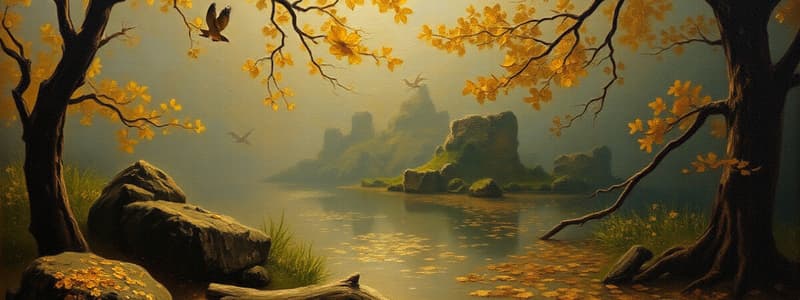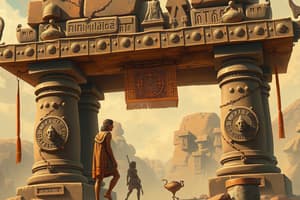Podcast
Questions and Answers
What materials combined to create bronze during the Bronze Age?
What materials combined to create bronze during the Bronze Age?
- Copper and iron
- Copper and tin (correct)
- Tin and zinc
- Copper and lead
Which of the following materials was not locally available in the Bronze Age and led to trade networks?
Which of the following materials was not locally available in the Bronze Age and led to trade networks?
- Silver
- Copper
- Tin (correct)
- Gold
What was the primary function of lunulae during the Bronze Age?
What was the primary function of lunulae during the Bronze Age?
- Neck ornaments (correct)
- Armour decoration
- Fastening garments
- Religious symbols
What are fulachtaí fia more commonly known as?
What are fulachtaí fia more commonly known as?
Where were gold torcs typically worn?
Where were gold torcs typically worn?
What does the term 'repoussé' refer to in Bronze Age metalwork?
What does the term 'repoussé' refer to in Bronze Age metalwork?
Which of the following techniques was NOT used on the Tedavnet Sun Disc?
Which of the following techniques was NOT used on the Tedavnet Sun Disc?
What feature is prominently found at both ends of the Glenisheen Gorget?
What feature is prominently found at both ends of the Glenisheen Gorget?
What was the Blessington Lunula primarily made of?
What was the Blessington Lunula primarily made of?
What would the Glenisheen Gorget signal about the wearer during the Bronze Age?
What would the Glenisheen Gorget signal about the wearer during the Bronze Age?
What was the time frame for the Bronze Age?
What was the time frame for the Bronze Age?
Which of the following describes the crescent-shaped collars known as Lunulae?
Which of the following describes the crescent-shaped collars known as Lunulae?
What was the primary purpose of the fibula during the Bronze Age?
What was the primary purpose of the fibula during the Bronze Age?
Which technique was commonly used alongside repoussé in the creation of gold torcs?
Which technique was commonly used alongside repoussé in the creation of gold torcs?
What materials primarily constituted the decorative elements of the Glenisheen Gorget?
What materials primarily constituted the decorative elements of the Glenisheen Gorget?
Where was the Blessington Lunula found?
Where was the Blessington Lunula found?
Which of the following is NOT a technique used on the Tedavnet Sun Disc?
Which of the following is NOT a technique used on the Tedavnet Sun Disc?
What does the term 'lunula' derive from?
What does the term 'lunula' derive from?
What significant role did tin play in the development of Bronze Age trade networks?
What significant role did tin play in the development of Bronze Age trade networks?
What artistic characteristic did Lunulae, torcs, and sun discs symbolize during the Bronze Age?
What artistic characteristic did Lunulae, torcs, and sun discs symbolize during the Bronze Age?
Flashcards are hidden until you start studying
Study Notes
Bronze Age Overview
- The Bronze Age spanned from 2500 BCE to 500 BCE.
- It is divided into three phases: Early, Middle, and Late Bronze Age.
Gold in Ireland
- Gold was discovered in streams and rivers located in the Wicklow hills.
- The process of repoussé involves hammering designs onto the reverse side of thin gold objects.
Composition of Bronze
- Bronze is an alloy made from copper and tin.
- Tin, not locally available in many regions, prompted the establishment of extensive trade networks.
Archaeological Discoveries
- Fulachtaí fia are also referred to as cooking pits, commonly found in the archaeological record.
- Lunulae are crescent-shaped collars, serving as neck ornaments and symbols of wealth, power, or social standing.
Artistic Sophistication
- Items such as lunulae, torcs, and sun discs displayed artistic sophistication and reflected the social status of their owners.
- The Tedavnet Sun Disc, made of gold, featured techniques like repoussé, incision, and punching.
Key Artifacts
- The Tedavnet Sun Disc was discovered in Tedavnet, County Monaghan.
- The term "lunula" derives from the Latin word for "little moon."
Notable Artifacts: Lunulae and Torcs
- The Blessington Lunula, also made of gold, was found in County Wicklow.
- Gold torcs are neck ornaments characterized by a circular shape with an open-ended design. They were crafted using techniques like twisting, braiding, casting, forging, engraving, embossing, and repoussé.
Glenisheen Gorget
- The Glenisheen Gorget features two large decorative discs at both ends.
- This ornament served as an adornment, indicating the wearer's high social status and significance within their community.
- Decorative patterns on the Glenisheen Gorget were created using repoussé and chasing techniques, discovered in Glenisheen, County Clare.
Fibula
- The fibula primarily functioned to fasten garments and was largely made of bronze.
- Decorating techniques for the fibula included engraving, repoussé, and inlaying with other materials.
Bronze Age Overview
- The Bronze Age spanned from 2500 BCE to 500 BCE.
- It is divided into three phases: Early, Middle, and Late Bronze Age.
Gold in Ireland
- Gold was discovered in streams and rivers located in the Wicklow hills.
- The process of repoussé involves hammering designs onto the reverse side of thin gold objects.
Composition of Bronze
- Bronze is an alloy made from copper and tin.
- Tin, not locally available in many regions, prompted the establishment of extensive trade networks.
Archaeological Discoveries
- Fulachtaí fia are also referred to as cooking pits, commonly found in the archaeological record.
- Lunulae are crescent-shaped collars, serving as neck ornaments and symbols of wealth, power, or social standing.
Artistic Sophistication
- Items such as lunulae, torcs, and sun discs displayed artistic sophistication and reflected the social status of their owners.
- The Tedavnet Sun Disc, made of gold, featured techniques like repoussé, incision, and punching.
Key Artifacts
- The Tedavnet Sun Disc was discovered in Tedavnet, County Monaghan.
- The term "lunula" derives from the Latin word for "little moon."
Notable Artifacts: Lunulae and Torcs
- The Blessington Lunula, also made of gold, was found in County Wicklow.
- Gold torcs are neck ornaments characterized by a circular shape with an open-ended design. They were crafted using techniques like twisting, braiding, casting, forging, engraving, embossing, and repoussé.
Glenisheen Gorget
- The Glenisheen Gorget features two large decorative discs at both ends.
- This ornament served as an adornment, indicating the wearer's high social status and significance within their community.
- Decorative patterns on the Glenisheen Gorget were created using repoussé and chasing techniques, discovered in Glenisheen, County Clare.
Fibula
- The fibula primarily functioned to fasten garments and was largely made of bronze.
- Decorating techniques for the fibula included engraving, repoussé, and inlaying with other materials.
Studying That Suits You
Use AI to generate personalized quizzes and flashcards to suit your learning preferences.




